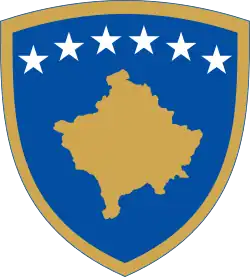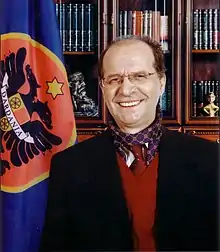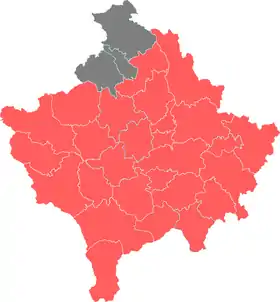1992 Kosovan general election
General elections were held in Kosovo on 24 May 1992 to elect a President and Assembly. The overwhelming majority in the Assembly was won by the Democratic League of Kosovo (LDK), while its leader Ibrahim Rugova was elected President of Kosovo.[1]
| ||||||||||||||||||||||||||||||
|
| ||||||||||||||||||||||||||||||
Presidential election | ||||||||||||||||||||||||||||||
| ||||||||||||||||||||||||||||||
| ||||||||||||||||||||||||||||||
127 of the 140 seats in the Assembly of Kosovo 66 seats needed for a majority | ||||||||||||||||||||||||||||||
| ||||||||||||||||||||||||||||||
 |
|---|
| Constitution and law |
Prior to the elections, on 8 May the LDK declared that, "since the May 24 elections, announced by the Assembly of the Republic of Kosova, not as a struggle of Kosovo political parties for power, but as an organized and massive attempt to not accept the power structures and the status that Serbia is trying to impose on us, the LDK will try to campaign, organize and conduct elections to develop in the spirit of full cooperation, in different ways and forms, between all political parties and other political entities ”.[2]
Conduct
The elections were monitored by eight groups of observers from the United States and European countries. Konrad Hubers, who led the Delegation of the American Congress Foundation for Human Rights, assessed that these elections are a historic moment for Kosovo.
The Serbian government declared the elections illegal and deployed a large number of police officers to put pressure on and disrupt the election process. However, 89.32 percent of voters took part in the voting and 99.7 percent of them voted for Ibrahim Rugova as president.[3]
Results
The elections were attended mainly by Albanians and Turks, while the Serb-Montenegrin minority had a small turnout. According to the constitution and the electoral system, 14 seats, or 10 percent of them, belonged to Serb candidates who boycotted the election process. But these seats remained unfulfilled all the time, as the right of the Serb minority to administer them. Such an act was not undertaken by threatening and coercive factors, rather it was an expression of the philosophy of peace and international law for the respect of minority rights. Meanwhile, it was an act by which the Albanians proved the difference with Milosevic's policy in treating the Serb-Montenegrins minority.
President
The presidential elections were held in both Kosovo and abroad in places where Kosovo Albanians were employed. In Kosovo, 762,257 voters voted for Ibrahim Rugova for President of Kosovo (invalid ballots and "against" were 3812), while 105,300 voters voted outside Kosovo.
| Candidate | Party | Votes | % | |
|---|---|---|---|---|
| Ibrahim Rugova | Democratic League of Kosovo | 863,745 | 100.00 | |
| Total | 863,745 | 100.00 | ||
| Valid votes | 863,745 | 99.56 | ||
| Invalid/blank votes | 3,812 | 0.44 | ||
| Total votes | 867,557 | 100.00 | ||
Assembly
The Democratic League of Kosovo received 76% of the vote and won 96 seats in parliament. The Parliamentary Party of Kosovo received 4.86%, winning 13 seats. It was followed by the Peasant Party and the Albanian Christian Democratic Party of Kosovo with just over 23,000 votes and seven seats each.[4] The 13 seats for Serbs and Montenegrins were unfilled.[5]
| Party | Votes | % | Seats | |
|---|---|---|---|---|
| Democratic League of Kosovo | 574,755 | 76.38 | 96 | |
| Parliamentary Party of Kosovo | 36,549 | 4.86 | 14 | |
| Peasant Party of Kosovo | 23,682 | 3.15 | 7 | |
| Albanian Christian Democratic Party of Kosovo | 23,303 | 3.10 | 7 | |
| PRK | 14,080 | 1.87 | 0 | |
| Party of Albanian National Union | 11,770 | 1.56 | 0 | |
| Albanian National Democratic Party | 10,158 | 1.35 | 0 | |
| Party of Democratic Action | 6,961 | 0.93 | 1 | |
| SHKSH | 6,412 | 0.85 | 0 | |
| Social Democratic Party of Kosovo | 6,064 | 0.81 | 0 | |
| PLSH | 3,458 | 0.46 | 0 | |
| LGJK | 3,112 | 0.41 | 0 | |
| PRSH | 2,493 | 0.33 | 0 | |
| FISH | 2,033 | 0.27 | 0 | |
| LRDK | 1,079 | 0.14 | 0 | |
| SHZP | 509 | 0.07 | 0 | |
| PPSH | 441 | 0.06 | 0 | |
| THP | 345 | 0.05 | 0 | |
| HK | 288 | 0.04 | 0 | |
| SHBI | 132 | 0.02 | 0 | |
| PSHGJ | 156 | 0.02 | 0 | |
| Independents | 24,702 | 3.28 | 2 | |
| Total | 752,482 | 100.00 | 127 | |
| Valid votes | 752,482 | 98.64 | ||
| Invalid/blank votes | 10,384 | 1.36 | ||
| Total votes | 762,866 | 100.00 | ||
| Registered voters/turnout | 853,432 | 89.39 | ||
| Source: Source | ||||
Aftermath
The new Assembly first attempted to be constituted on 23 July, secretly in an Islamic religious school in Pristina, but was blocked at the school entrance by numerous heavily armed police forces. Five deputies were arrested and sentenced to two months in prison, "for hostile activity against the territory of the Republic of Serbia and violation of its constitution." Therefore, the Kosovo Parliament conducted its work in working groups, mainly in exile, in Albania and Macedonia, where the deputies were forced to flee, after being threatened by the repressive measures of the Serbian state, which these deputies had declared illegitimate in the territory of Kosovo.
References
- "Këta ishin 130 deputetët e Parlamentit të Kosovës në vitin 1992, prej tyre 96 të LDK-së". May 24, 2020.
- "KUJTESË-24 MAJI 1992, DITA E ZGJEDHJEVE TË PARA TË KOSOVËS REPUBLIKË".
- "Pse harrohen 130 deputetët e Parlamentit të Kosovës në vitin 1992?". November 4, 2020.
- "Zgjedhjet e 24 majit 1992 janë themeli i shtetësisë së Kosovës bazuar në filozofinë politike të Ibrahim Rugovës". Syri | Lajmi i fundit. May 24, 2020.
- The Kosovo Report p45

